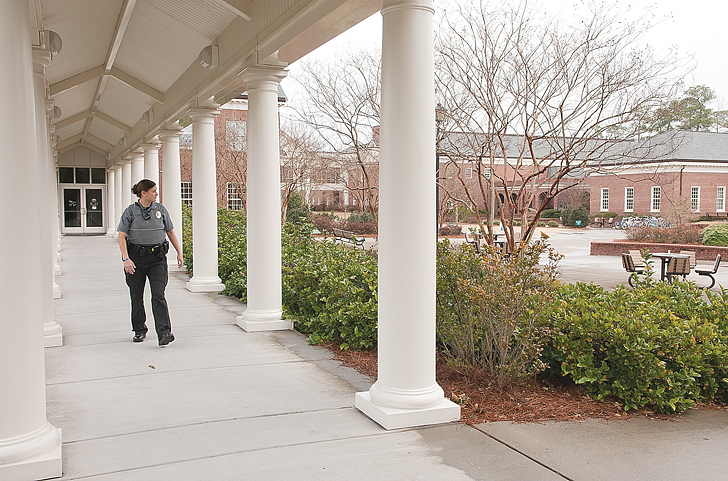By Elizabeth Weaver
Intern
Despite the security measures in place to protect the thousands of young adults who attend, a college campus can still be a dangerous place, especially for young women.
The dangers facing students on a college campus were highlighted recently when a female student reported being assaulted by three men on the University of North Carolina Wilmington campus. After investigating, UNCW police determined the attack didn’t occur as reported. But such incidents do take place at the university.
Statistics have fluctuated as reporting methods have changed. In 2012, three sexual offenses were reported to campus police, followed by nine in 2013, 16 in 2014, and more recently, eight in 2015. In 2014, UNCW changed its reporting methods to allow for anonymous accounts of a sexual assault.
UNCW Police Chief David Donaldson said the university’s department actively works to maintain a safe college environment by offering security escorts, random patrols of the residential areas, community feedback on areas that feel unsafe, and by offering safety awareness classes.
“We do more than 100 different programs each year,” Donaldson said. “We do community feedback on areas that feel unsafe. We are patrolling the residence halls unannounced and we are here 24 hours a day. There are anonymous reporting mechanisms. You can report by phone, email, or text. We partner in so many areas.”
A sexual assault can be defined as anything from groping to a forcible rape, said Sgt. Jennifer Paluck of the UNCW Police Department.
“This is just the number of people who reported it to the police. There are, unfortunately, cases that are only reported to CARE,” Paluck said, referring to the Collaboration for Assault Response and Education, a crisis intervention service offered at UNCW for cases of relationship abuse, sexual assault, stalking and harassment.
In the case of the last week’s investigation, Donaldson said it wasn’t likely that the student would be charged for making a false report, partly because there was evidence an assault took place, just not at the time and place she reported. Donaldson added that charging her with filing a false report may discourage victims of sexual assault from coming forward.
“Every opportunity that we have to win confidence in reporting, we want to take that opportunity,” Donaldson said.
Even the numbers reported to CARE are likely low, said Adam Hall, the assistant director of violence prevention for the service.
“I will always fall back to sexual violence, stalking, any form of sexual harassment, as being under reported,” Hall said. “There is far too much fear associated with it. There is just so much anxiety that people aren’t going to report.”
The UNCW Police Department offers a class for female students who want to know how to protect themselves by learning self-defense methods. Through its popular Rape Aggression Defense, or RAD, course, women can learn self-defense methods that can help prevent abduction or an attack.
“Having gone through the course myself I walked away being a lot more aware of my own strengths and perhaps limitations of my strengths,” Donaldson said. “So much of the course is about awareness and personal safety.”
Paluck leads the class, which focuses on how to react to attacks and on preventative steps to avoid at-risk social situations. Paluck’s goal is to teach women to avoid abduction.
The RAD classes are divided up into four sessions throughout a course of two weeks. Participants learn defensive blocks, kicks, punches and other self-defense moves. On the last day of the class, participants undergo a simulated attack from the “Redman,” a male officer protected by padding. Each class participant uses the skills she has learned to defend herself from the “Redman” long enough to escape.
Paluck laughed when asked how the men felt about being punching bags for college-aged women.
“I think they get a little bit upset if you don’t hit them hard enough,” she said. “We have a very special group of males that work here. They care about what RAD does as far as helping these girls and they understand how important it is.”
RAD is free to any woman, not just students, and those interested in signing up should contact Sgt. Paluck at the university police department at 910-962-2222 or at [email protected].




